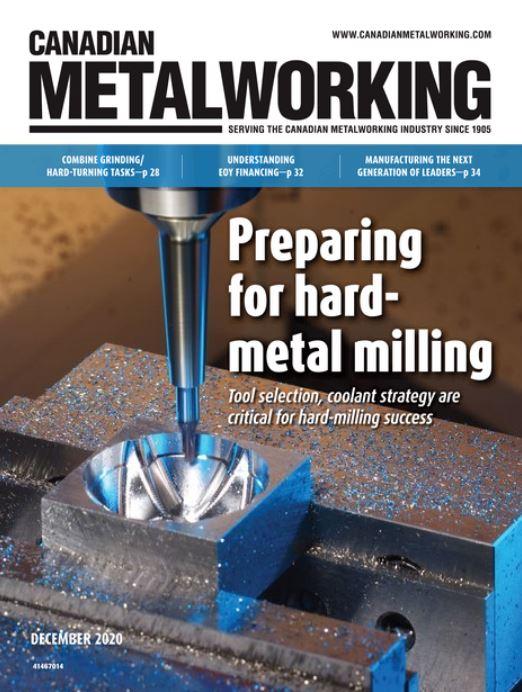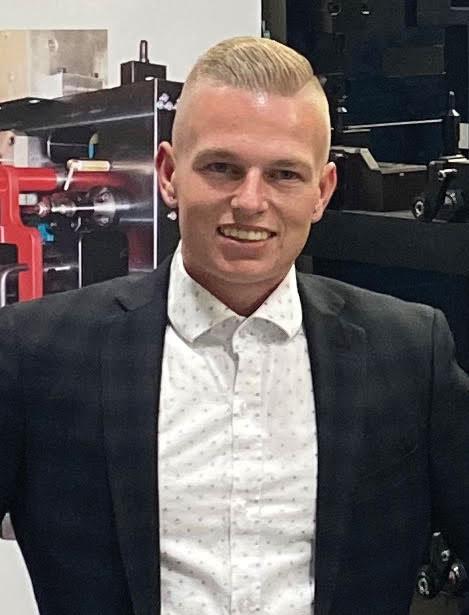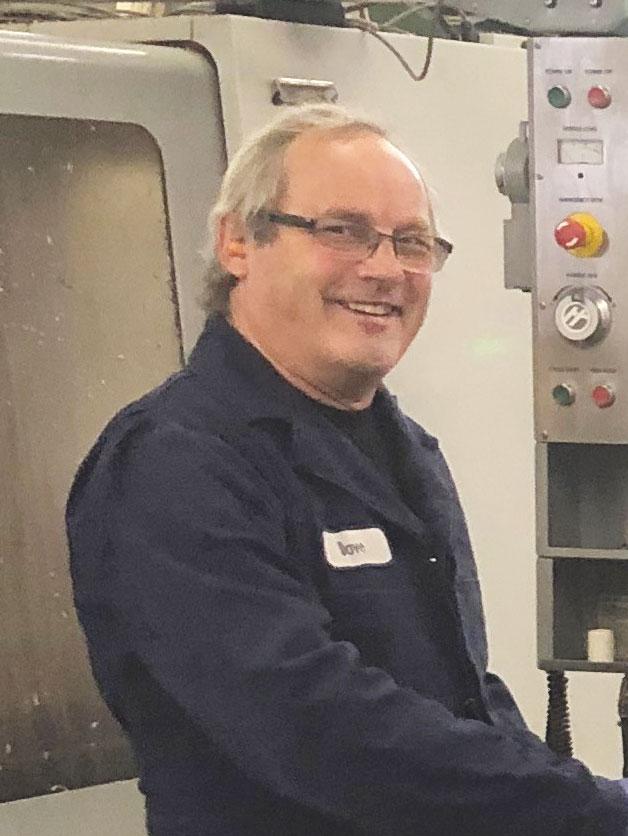Editor
- FMA
- The Fabricator
- FABTECH
- Canadian Metalworking
Manufacturing the next generation of leaders
By using tribal knowledge and new technology, tomorrow’s manufacturers can meet any challenge
- By Joe Thompson
- December 4, 2020
- Article
- Made In Canada
We’ve all heard it said: Manufacturing is dead. It’s all being done somewhere else, overseas, where they have lax safety regulations and lower wages. The trouble is, that’s not the case.
Manufacturing is very much alive in Canada, where the standard of living is high, where workers are highly skilled, and where the quality of manufactured goods is remarkable. In short, Made in Canada means something.
To keep this level of excellence, however, we need more skilled and semi-skilled workers for our manufacturing facilities. There is a shortage, but these are not your grandfather’s manufacturing jobs. They are highly paid positions that need employees with problem-solving skills and knowledge gained both in school and on the job so Canada can create some of the most highly advanced parts in the world.
In this issue of Canadian Metalworking we introduce you to a few of the industry’s next generation of manufacturing leaders who will keep part production – and jobs – in Canada.
Mitch Nickleson
Nickleson Machine & Tool
Windsor, Ont.
www.nicklesontool.com
Not many shops can trace their roots back more than eight decades to the country’s interwar period, but Nickleson Machine & Tool is one of them. Even more surprising is that it has remained a family business the whole time.
Established in 1932 by Charles Nickleson II, the company primarily served the nearby automotive giants in the early days. Proudly a family-owned and -operated business, Nickleson Machine & Tool has a manufacturing tradition that spans five generations within the Nickleson family.
While Charles Nickleson IV and Charles Nickleson V still are both active in the day-to-day operations of the shop, the current president is Chuck Nickleson. His son Mitch is the fifth generation of his family to work at the shop.
“For as long as I can remember, I always wanted to be involved in my family’s business,” said Mitch Nickleson, sales manager/business development.
All it took was a childhood trip to the shop with his brother CJ Nickleson, who is now the company’s purchasing manager, and Mitch was hooked.
“We watched the runoff of a robotic welding cell we were building at that time and I remember being astonished and very intrigued while I watched the robots cycle around. I knew from that point on that it was what I wanted to do for a career,” said Mitch.
At 13 years old he started where most do: at the bottom. The job involved sweeping, painting, and cleaning machines. Eventually he enrolled in the Ontario Youth Apprenticeship Program (OYAP) that was offered by his high school and he began learning the ins and outs of the trade.
Today Nickleson Machine & Tool specializes in the design and manufacture of custom CNC workholding fixtures and custom tooling technology for production manufacturing environments within the automotive and aerospace industries. Primarily working with Tier 1, 2, and 3 suppliers, but also several OEM suppliers, the company even does some sub-contract machining and assembly work, all out of its 32,000-sq.-ft. facility.
Such a wide variety of needs within this industry demands in-house expertise and a constant obligation to be learning.
“One thing that has helped me along the way was always listening carefully to the guys with experience,” explained Mitch. “At Nickleson we have very little turnover with our employees and a lot of highly skilled tradespeople and engineers with many years of experience. I have found this to be an asset and I tried to tap into them as much as possible.”
Even at a fifth-generation family-run shop, transferring knowledge to younger workers is imperative. Mitch pointed to a couple of people who helped him along the way.
“A couple of people that have helped me during my time in this industry was my dad Chuck Nickleson and Darren Roy,” he said. “Like many family-owned companies, when you’re the owner’s son, you have to have big shoulders. During my time on the floor I got used to working on difficult jobs. From a young age I was always taught great work ethics and morals.
“My father has been working in this industry for a long time, and like me he started with broom in his hand. He has always taken the time to answer any questions I've had. Darren Roy, who was our lead toolmaker at the time and now is our plant supervisor, helped me a lot with learning the technical side of our business.”
After spending years running machines and doing assembly work on the floor, Mitch now works in a sales management and business development role. It consists of finding new customers and business opportunities, developing key accounts, and working with the company’s engineering team.
He also is in charge of marketing Nickleson products online and over social media.
“On top of that, because Nickleson Machine & Tool is a family-owned business, I am learning how the business is run in hope of future succession,” he added.
Years spent learning how to run machines, including milling, turning, fabricating, grinding, assembly, inspection, and testing, gave Mitch a good understanding of the company’s products and what services they are able to offer customers. A recent investment in new CNC equipment, software, and tooling will help improve the shop’s quality, capabilities, and throughput.
“We are always trying to find ways to better serve our customers from a delivery, price, and quality standpoint,” said Mitch.
An example of this came from several of the company’s customers who started asking for more internal feed lines on their fixtures, which required gundrilling operations during the manufacturing process. To fill this need, the company purchased a 4-axis Tarus CNC deep-hole drilling machine.
“Purchasing our gundrill turned out to be a great decision. We have gained control of this application and it has made us more flexible,” said Mitch.
The company is also working toward receiving their Canadian Controlled Goods (CCG) certification, which should open up several new opportunities. Additionally, they have recently joined the Canadian Tooling & Machining Association (CTMA).
“Joining the CTMA is a great way for our company to network with other companies within the manufacturing industry,” he said.
Reaching a century in business is a target that now is in view for Nickleson, but it will come with some challenges.
“I truly believe that the technology in our industry moves at a rapid pace, and I feel to be a leader you need to ‘stay in the know’ on new technologies and processes that can fit within your company. I also feel it is important to have a presence online. This is a big tool our generation has that my predecessors never had,” he said.
Elliot Daigneault
BizBiz Share
Montreal
www.bizbizshare.com
BizBiz Share isn’t a typical company in the manufacturing industry. In fact, it doesn’t even manufacture parts at all.
Instead it provides a service, one that wouldn’t have been possible even a decade ago. The company truly is part of the 21st century manufacturing landscape. BizBiz Share is a platform that allows companies to collaborate to gain access to manufacturing resources they need and optimize the efficiency of what they own.
It’s a fun story.
“Several years ago, while living in Northern Alberta and working in the oil fields, a problem occurred,” explained CEO Elliot Daigneault. “A piece of machinery we were working with broke and we had to wait two days for it to get fixed. During those two days, we were driving around the work site when we passed in front of another company’s equipment yard where the exact same piece of machinery that we had that was broken was sitting idle. The idea to share excess machinery was born.”
That was the beginning of BizBiz Share, which launched five years ago to provide an online platform to share underused equipment. Think of it as Airbnb for machine tools.
“We targeted manufacturers and managed to get more than 2,000 different companies to join,” said Daigneault. “I do believe that a platform like ours, capable of identifying unused capacity and transferring it to other companies who need it, will be the future.”
Soon another common problem became apparent. Some of the manufacturers had excess inventory lying dormant in their warehouses with no true way to liquidate it. So Daigneault launched BizBiz Stock, a marketplace where manufacturers can buy and sell excess metal inventory.
Both websites allow you to post your extra capacity as well as view others in your area that may have a need.
“The lungs of a country's economy are its manufacturing force,” said Daigneault. “And sadly, very little tech-driven innovation is catered to these important companies. We have had the chance to meet with more than 5,000 manufacturing companies and got to understand very intimately their daily operational problems. Fixing these problems is what drew me in.”
As CEO of the company, Daigneault has the role of overseeing all aspects of the company and ensuring that all of its moving parts work in unison. He also has had a lot of help along the way.
“I was lucky enough to be surrounded with incredible people that helped our company flourish. To this day, we have great mentors, investors, shareholders, directors, and staff all dedicated to our mission and with a passion for helping solve problems faced by the manufacturing sectors,” he said.
As the head of a tech company, Daigneault still sees soft skills as being vital in today’s manufacturing environment.
“I believe adaptability is the most crucial skill to possess in any industry. Life is dynamic, business is messy. Being able to face challenges and adapt to ever-changing situations is paramount,” he said.
He also said leaders need to have an open mind.
“Manufacturing is a very conservative industry and change is slow. However, we are seeing a transition led by the next generation who are ever more comfortable with technology, data, analytics, and circular economy principles,” said Daigneault.
David Peare
Patton & Cooke
Surrey, B.C.
www.pattonandcooke.com
A common trait found among manufacturing leaders is an ingrained curiosity. It’s what helps them learn new skills and challenges them to take on new work for their companies.
It’s also what enables them to continue learning as they progress in their careers. Having a family that is steeped in manufacturing tradition only amplifies this advancement. That is what got David Peare involved in manufacturing at an early age.
“I come from a large family with a vast mechanical aptitude,” said Peare. “During the war, my granddad made live steam engines. My dad was the chief engineer at Rolls-Royce [building gas turbines]. People in our neighbourhood knew of us because of our homemade projects; my brothers and I made everything from rockets, electric go-karts to motorcycles and various robotic mechanical devices during my teenage years.”
Coming from a family of engineers, it was natural that Peare excelled in his high school’s vocational program. After graduating he began his career in the CAE machinist training program, making components for flight simulators and Canadarm.
Peare not only works at Patton & Cooke, a well-known manufacturer of high-voltage electrical connectors, he also is a local, part-time machining instructor.
“My desire is to learn,” he said. “I want to keep up to date with the ever-evolving manufacturing technology, think outside the box, ask questions, and collaborate with others.”
As an instructor himself, it’s no surprise that it was another educator that influenced Peare when he was growing up.
“My mentor was my machine shop teacher in high school, Mr. Hatter. He made learning fun by using meaningful examples. He had an enthusiastic approach to communicate and convey the knowledge within him,” said Peare.
It’s probably one of the reasons that Peare continues his education.
“I’m a lifelong learner. I have spent most of my career enrolled in various machining and engineering programs,” he said. “I completed the Provincial Instructor Diploma that certified me as a post-secondary instructor, and I sit as the co-chair machinist for Skills Canada B.C., a skilled-trades competition.”
Peare also is involved with developing new criteria for the Machinist Red Seal Exam.
His full-time shop job is machining components for high-voltage electrical connectors used in mining operations and electrical utilities. The company also supplies ship-to-shore power connectors to cruise lines and freight terminal ports worldwide.
Part of the job that he likes the most is the problem-solving that comes with manufacturing, including developing more efficient methods of production.
“I am a sucker for punishment. I can never say no. I love to work with people and develop a collaborative way for new ideas to flourish,” he said.
Part of learning is adapting to new technology. In manufacturing this is very easy to do as new products enter the marketplace. For Peare that means thinking in three dimensions and working with the latest in machine tools.
“I love to work with 3D modelling software, 3D-print it, and produce it on various machines and machining tools. Five-axis machining is becoming commonplace [in the shop]. This machine will combine operations that used to be performed with multiple setups or with other equipment,” he said.
It’s no surprise that Peare feels strongly about educating future manufacturing professionals. His advice: start early.
“We need to start educating the manufacturing trades early in high school and expose them to gain their interest in what is happening in the industry,” he said. “I tell all my students that learning does not end once you get your Red Seal. You will be continually learning as the trade evolves. The next generation of manufacturing leaders will be successful if they are flexible, adapt to the ever-changing technology, and become fluid in all aspects of the machining world.”
Editor Joe Thompson can be reached at jthompson@canadianmetalworking.com.
About the Author

Joe Thompson
416-1154 Warden Avenue
Toronto, M1R 0A1 Canada
905-315-8226
Joe Thompson has been covering the Canadian manufacturing sector for more than two decades. He is responsible for the day-to-day editorial direction of the magazine, providing a uniquely Canadian look at the world of metal manufacturing.
An award-winning writer and graduate of the Sheridan College journalism program, he has published articles worldwide in a variety of industries, including manufacturing, pharmaceutical, medical, infrastructure, and entertainment.
subscribe now


Keep up to date with the latest news, events, and technology for all things metal from our pair of monthly magazines written specifically for Canadian manufacturers!
Start Your Free Subscription- Trending Articles
Automating additive manufacturing

Sustainability Analyzer Tool helps users measure and reduce carbon footprint

CTMA launches another round of Career-Ready program

Sandvik Coromant hosts workforce development event empowering young women in manufacturing

GF Machining Solutions names managing director and head of market region North and Central Americas

- Industry Events
MME Winnipeg
- April 30, 2024
- Winnipeg, ON Canada
CTMA Economic Uncertainty: Helping You Navigate Windsor Seminar
- April 30, 2024
- Windsor, ON Canada
CTMA Economic Uncertainty: Helping You Navigate Kitchener Seminar
- May 2, 2024
- Kitchener, ON Canada
Automate 2024
- May 6 - 9, 2024
- Chicago, IL
ANCA Open House
- May 7 - 8, 2024
- Wixom, MI



















